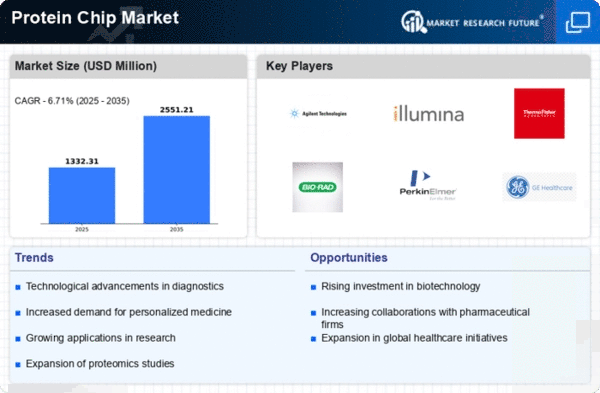Market Trends
Key Emerging Trends in the Protein Chip Market
Recent advances in proteomics, personalized medicine, and diagnostics have spurred protein chip industry development and innovation. Significant market trends may reveal how protein chip technologies are evolving, which is crucial for high-throughput protein research. Protein chips are increasingly used in proteomics research. These chips allow you to analyze several proteins at once, making it simpler to investigate protein interactions, protein changes, and signal detection. We learn more about complex biological systems from this tendency. Personalized medicine is growing, and protein chips are essential to genetic testing. These chips provide patient-specific protein fingerprint profiling. This lets physicians identify therapeutic targets and tailor therapy to each patient's protein expression patterns. As protein chip technology improves, high-throughput screening becomes feasible. This approach helps uncover medication candidates and speed up drug development by evaluating protein interactions quickly. Protein chips are being utilized to detect illnesses. These chips identify and validate disease-related protein biomarkers. This helps us detect illnesses early, predict therapy response, and monitor treatment efficacy. Microfluidics is a major protein chip trend. Microfluidic-based protein chips offer precise sample quantities, faster response speeds, and compact tests, which increase sensitivity and reduce reagent consumption. Protein chips with multiplexed assays may screen numerous proteins at once, making them more helpful. This development is essential for cancer research and inflammatory disease diagnosis because protein group analysis helps us understand complex biological processes. Protein chips are being employed in Point-of-Care Testing. Small, easy-to-use protein chip devices simplify on-site examinations. They enable rapid, widespread testing for viral illnesses, cardiac biomarkers, and cancer indicators. Marketed 3D protein chip systems are appearing. These techniques improve spatial clarity and protein interaction settings to mimic live objects. By simulating complex cellular microenvironments, 3D protein chips might help scientists study cell biology and discover novel treatments. Analytics and data are becoming more crucial in the protein chip sector. Protein chip investigations provide increasingly complicated data, requiring more powerful bioinformatics tools to investigate, comprehend, and make conclusions.
Protein chip companies are offering additional systems and services. This trend makes protein chips simpler for academics and clinicians to access, leading to increasing academic, industrial, and clinical application. Protein chip companies are collaborating to become worldwide and develop their technology. Tech businesses, research institutes, and healthcare organizations collaborate to develop protein chip solutions.


















Leave a Comment